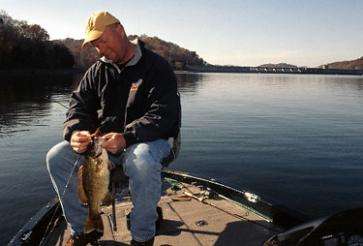
Finally, it’s starting to rain. We’re supposed to get more in the next two weeks, and it looks like most of the country will be covered over. That’s really good news. The lakes have been down and are kind of stagnant. This will get everything going for the late fall. The water should pick up some much needed oxygen, and it’ll get a little stain to it.
Both those things have a tendency to make the fish more active. When they’re active, they’re easier to catch once you find them. I’m headed out tomorrow and will go directly to the creeks. The water flowing into them will carry a lot of stuff that’ll attract the baitfish. And, as you know, if you find the baitfish, the smallies won’t be far behind. It should be a good day. The best creeks — the ones I’m going to fish — will be crooked with a lot of rock and wood in them.
I want a creek that keeps the water flowing and that provides a lot of ambush points for the bass. In stained water, they’ll use almost anything — rocks, weeds, loose wood, stumps and laydowns are all perfect places. The fish should be shallow, too. I’ll be throwing a jig right up against the bank into whatever ambush spot I can find. After a few hops, I’ll start moving it along the bottom until it’s about halfway to the boat. If I haven’t caught one by then, it’s time to pick another target. If they don’t bite it pretty quick, they probably aren’t there.
Of course, shallow means different things to different anglers. In my lake, it’s around 20 feet. In yours, it might be 2 or 3 feet. It just depends. I think a jig will be the best lure to use for the next few weeks. You can make really accurate casts with it and get into the right places. If you pick the right size and color, it’ll match the hatch, too. That’s a pretty good combination.
One trick that I’ve learned over the years when I’m fishing like this is to start with a big, heavy jig. You might not realize it, but that’ll let you cover more water. A heavy jig sinks faster and can be moved more efficiently through an area. It’ll also help you make more accurate casts, especially if the wind is blowing. I don’t care how much experience you have, light lures are harder to handle.
You should never be afraid to switch to a heavy lure if you’re having trouble with a light one. It’s much more important to make a good cast with a heavy lure than to make a sorry cast with a light lure. A lot of guys don’t realize that. We’ll talk about the moon next time.
Until next time, if you have any questions or comments, I’d love to hear from you. Please e-mail me atStephen@thesmallmouthguru.com.





